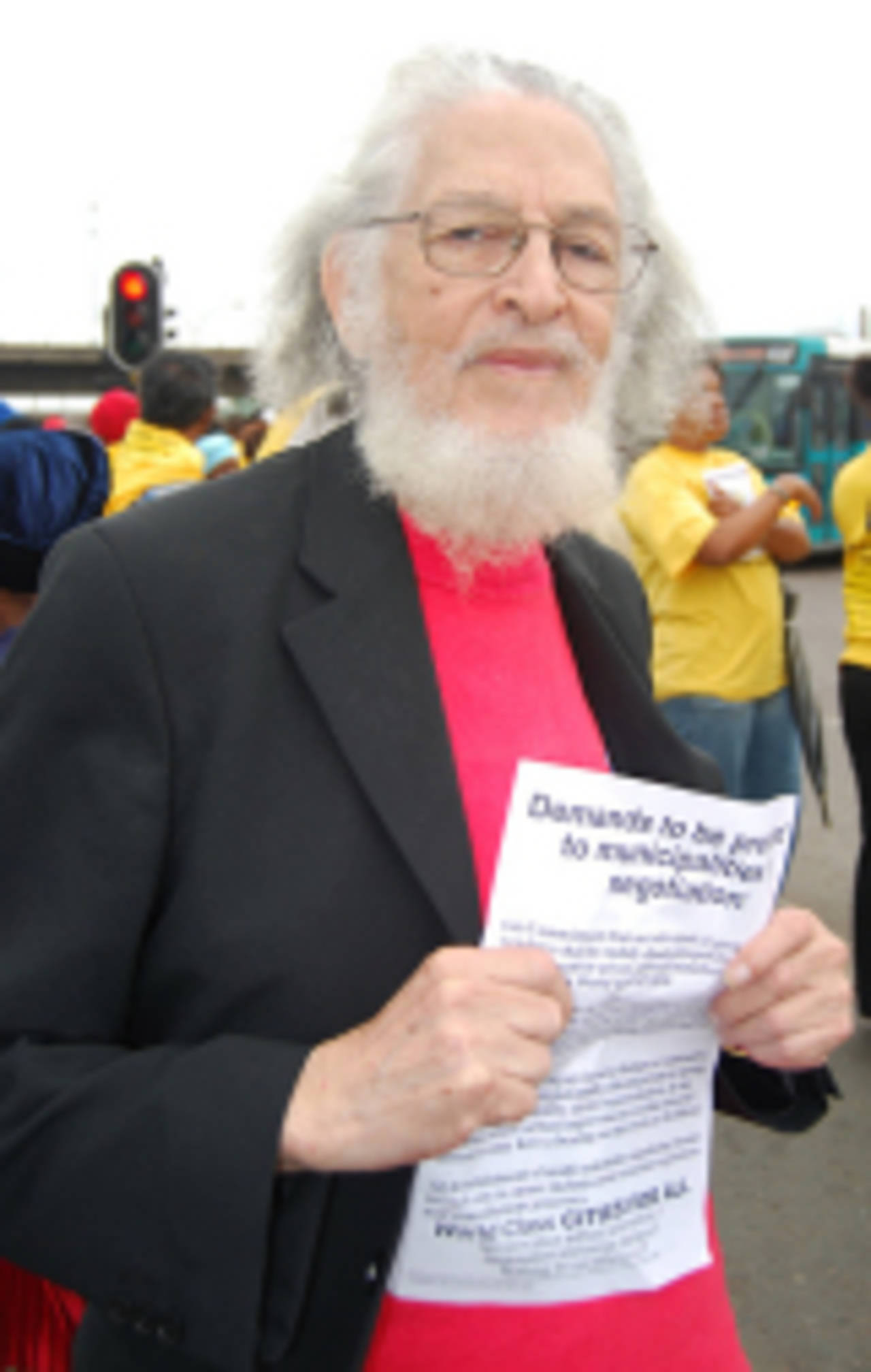Fifty years of fighting for justice
Sriram Veera
25-Feb-2013

ESPNcricinfo Ltd
I meet him in the middle of the road in Durban city centre. You first notice the grizzly flowing white beard, the long hair blowing in the wind, the sharp eyes and a lovely smile that light up his 85-year old face. Dennis Brutus is protesting. It’s the story of his life. An activist against the apartheid regime in the 1960s, he played a key role in getting South Africa suspended from Olympics. For his efforts he was arrested, shot in the back while trying to jump bail, arrested again and jailed in Robben Island. Along with a certain Nelson Mandela. He was also banned from teaching, writing and publishing in South Africa and, on his release, settled in the US as a political refugee. He was finally “officially unbanned” in 1990 and currently lives in Durban.
It’s safe to say the fire hasn’t dimmed. In 2007, Brutus was nominated for induction in the South African Sports Hall of Fame. The other recipient was Ali Bacher; Brutus says he was ambivalent about accepting the award but Bacher’s presence nailed it. After Bacher’s acceptance speech was Brutus’ turn. He walked to the stage and said: “It is incompatible to have those who championed racist sport alongside its genuine victims. It’s time - indeed long past time - for sports truth, apologies and reconciliation.” And then turned down the award. That’s the part, he says, the broadcasters didn’t show. “And I believe Bacher walked out in protest,” he says with a chuckle, a throaty infectious laugh.
We are in middle of a protest walkabout towards the almost century-old early morning market on Warwick Avenue, which is about to be shut down for a shopping mall in the beautification process before the 2010 World Cup. The protestors are a motley crowd of black and Indian street traders, fishermen, market representatives, street barbers, singing their way down the road in their yellow T-shirts bearing the message “World-class cities for all”.
The 2010 football World Cup, the cause of all this activity, is seen as the dark side of a big flashy World event every country desires on its CV. The chant is unambiguous: “Stop the traditional elitist approach to building cities in preparation of the World Cup. Include us”. The protestors, under the umbrella of streetnet.org.za, walk through the city (myself included), past the speeding cars, past the curious onlookers, past the hawkers who sing out their voice of support, past the homeless man who squints at us before breaking into a smile before the police stop us at the entrance to the market.
While representatives engage the police, Brutus’s friend Patrick Bond, director of UKZN Civil Society, offers a wry joke: “I don’t think they will teargas us here in the middle of this busy place.” Brutus laughs again as he shakes his head. Perhaps he’s recalling one of his own lines: “As usual the ministers will wine and dine, and protesters will suck teargas.”
The sky is slowly turning grey. The breeze had turned chilly and strong. There is rain in the air. Talks with the police are still on. Brutus continues telling me the story of his fight for racial equality on the sports field. “The first successful anti-apartheid movement in sport was in table-tennis. Our first victory was in 1956. When I came along in 1958 to SANROC (South Africa Non-racial Olympic Committee) I was working on what had been built by George Singh. Then, very significantly, Brazil were scheduled to play in a football event in Durban. They were told that the black players had to stay on the ship while the whites could come on shore. I sent a cable to Brazil’s president, Kubitschek [Juscelino Kubitschek de Oliveira]. ‘You cannot tolerate this racism against the black players.’ And he immediately responded by cancelling the match. That was exactly 50 years ago: March 1959.” Then Basil D’Oliviera happened. “In table-tennis, in football, and in cricket, the process gradually quickened.”
Meanwhile, in the here and now, the police relent and we turn into the bustling Morning Market, with hundreds of shops lined up next to each other. The shopkeepers join in with the protestors and the decibel level rises. Leaders of the different groups voice their concern. Henry Ramlal, the chairman of the market committee and a short fierce man, expresses his amazement in strong language. “This is ridiculous. You can beautify the entrance of the city; knock us out, take us down, but what you going to do with the heart of the city? The crime rate is already high and what will you achieve by demolishing our market. What will all these families do? Won’t crime go up?” He says the municipality has offered them a different location for four months. “What after that? What sort of plan is this? Isn’t our site a heritage site? Won’t the tourists come to this spot as a tourist attraction? More importantly, where are the poor people going to buy their stuff? You can’t clean the city of its people”
The other groups like formal black traders and the informal traders put forth their own concerns about disruption to their livelihood. The South African elections are on Wednesday. Much as in India, the chief concern here is the gap between rich and poor. The country, says Dennis, is at a crucial tremendous crossroads. “You’ve got to keep fighting. Keep fighting.”
Sriram Veera is a former staff writer at ESPNcricinfo